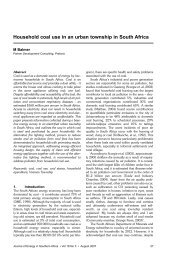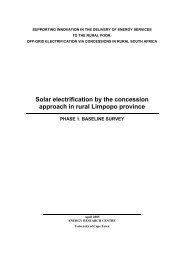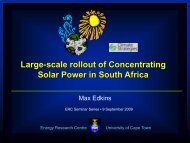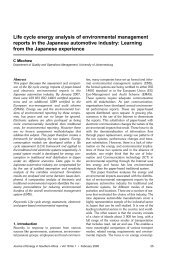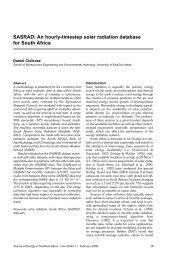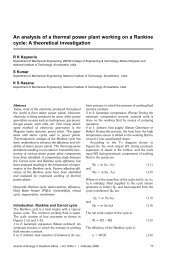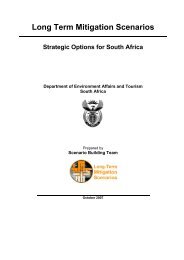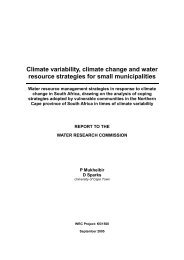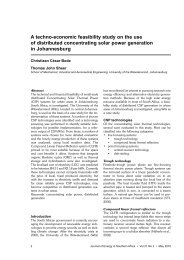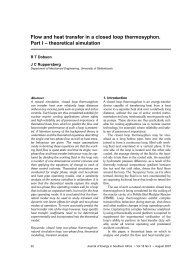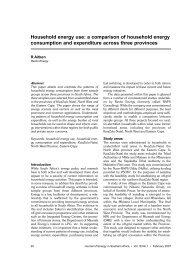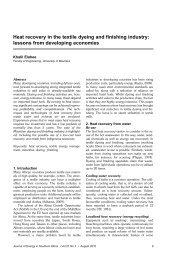(Ed) 2006. Energy policies for sustainable development in South Africa
(Ed) 2006. Energy policies for sustainable development in South Africa
(Ed) 2006. Energy policies for sustainable development in South Africa
You also want an ePaper? Increase the reach of your titles
YUMPU automatically turns print PDFs into web optimized ePapers that Google loves.
14 ENERGY POLICIES FOR SUSTAINABLE DEVELOPMENT IN SOUTH AFRICA<br />
economic competitiveness and future prosperity, as well as greatly improv<strong>in</strong>g the public<br />
transport system both with regard to service to commuters and technologically.<br />
Accomplish<strong>in</strong>g these tasks raises critical issues <strong>for</strong> energy sector policy. The major issues<br />
are: energy provision to the poor and disadvantaged, access to cleaner technologies,<br />
comply<strong>in</strong>g with both local and <strong>in</strong>ternational environmental legislations, and energy<br />
<strong>in</strong>tegration and security <strong>in</strong> <strong>Africa</strong> as a whole. We now look at these issues one by one.<br />
2.3.1 <strong>Energy</strong> provision to the poor and disadvantaged<br />
The government has stated that it wants 100% access to electricity by 2010, although it is<br />
not clear if the <strong>in</strong>tention is 100% grid electricity or if some of this will be off-grid. The<br />
quantity of electricity to be available to each household has yet to be decided. Orig<strong>in</strong>ally<br />
the plan was to supply households with 350 kWh/month, but experience has shown that<br />
newly connected households choose to consume between and 75kWh and 250 kWh per<br />
month, with an average of about 100 kWh/month (Prasad & Rann<strong>in</strong>ger 2003). Provision<br />
should still be made <strong>for</strong> higher consumption, because it is known that provid<strong>in</strong>g electricity<br />
leads to the <strong>development</strong> of other productive activities that use electricity. Further <strong>policies</strong><br />
will be required, as discussed below.<br />
Grid and off-grid electricity supply<br />
Generally, the overall macro-economic environment will determ<strong>in</strong>e the extent of<br />
electrification <strong>for</strong> the rema<strong>in</strong><strong>in</strong>g 20% of unelectrified households <strong>in</strong> urban areas and 50% <strong>in</strong><br />
rural areas, even though the multiplier effect of grid electricity can be significant if well<br />
planned. Eskom (2002) has shown that the cost of new connections is decl<strong>in</strong><strong>in</strong>g, but it is<br />
nevertheless clear that the cost of connect<strong>in</strong>g the rema<strong>in</strong><strong>in</strong>g urban and rural residents will<br />
be very high. Supply<strong>in</strong>g grid electricity to some rural areas is difficult because of their<br />
remoteness and low population density, so cost becomes prohibitive, and a weak rural<br />
economy makes cost recovery even more difficult. However, policy approaches based on<br />
‘tak<strong>in</strong>g electricity to the people’ or ‘br<strong>in</strong>g<strong>in</strong>g the people to electricity’ should be explored.<br />
Some problems have arisen because of the belief that ‘electricity <strong>for</strong> all’ means grid<br />
electricity <strong>for</strong> all. The government is presently support<strong>in</strong>g off-grid SHSs by allocat<strong>in</strong>g<br />
concessions, subsidis<strong>in</strong>g up to 70% of the capital cost and about 80% of the ma<strong>in</strong>tenance<br />
costs. The results, from the systems <strong>in</strong>stalled so far, are mixed, and the cost to the<br />
government is high (Afrane-Okese & Muller 2003). Policy attention will be required to<br />
ensure the susta<strong>in</strong>ability of the off-grid project.<br />
A limited programme carried out at Lwandle <strong>in</strong> the Western Cape shows that with the right<br />
policy, solar water heaters can be viable (Lukamba-Muhiya & Davidson 2003). The use of<br />
liquefied petroleum gas (LPG) is not yet widespread <strong>in</strong> <strong>South</strong> <strong>Africa</strong>, though it is <strong>in</strong>creas<strong>in</strong>g.<br />
Some barriers can be addressed by certa<strong>in</strong> <strong>policies</strong> and measures (Cowan 2005; Lloyd<br />
2002) and <strong>South</strong> <strong>Africa</strong> can learn from successful programmes <strong>in</strong> Botswana, Senegal and<br />
Ghana (Davidson & Sokona 2003).<br />
There are some ongo<strong>in</strong>g programmes aimed at <strong>in</strong>troduc<strong>in</strong>g improved cook<strong>in</strong>g stoves <strong>for</strong><br />
kerosene and coal. The Cape Technikon <strong>in</strong> Cape Town is work<strong>in</strong>g on improved kerosene<br />
stoves, and the government is promot<strong>in</strong>g low smoke fuel stoves us<strong>in</strong>g coal. These<br />
technologies, if widespread, would improve efficiency and reduce health hazards.<br />
Access to high quality transport fuels<br />
Susta<strong>in</strong>able <strong>development</strong> requires the improvement of petroleum fuels and the <strong>in</strong>troduction<br />
of cleaner transport fuels. It requires public transport to be greatly improved to provide<br />
essential travel, especially <strong>for</strong> the poor and disadvantaged. <strong>South</strong> <strong>Africa</strong>ns have far too



